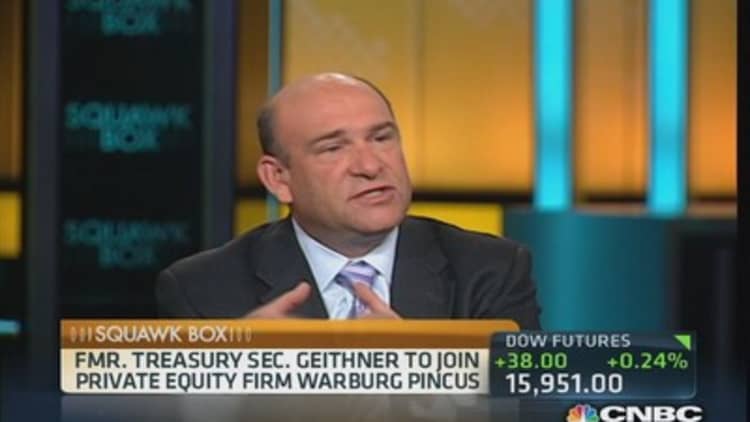
Former Treasury Secretary Tim Geithner had discussions—and presumably offers—from some of the biggest and best known firms on Wall Street. So why did he end up with the low-profile private equity firm Warburg-Pincus?
A person familiar with his thinking said among the reasons was that Geithner specifically did not want to work for a company that he either directly or indirectly regulated at the Treasury or the Fed. He is said to have been concerned with worsening the perception of mistrust that many Americans feel toward government and Wall Street.
Geithner, who headed the New York Federal Reserve Bank from 2003 to 2009, was a principal architect of the controversial bailouts of Bear Stearns and the insurance giant American International Group. As Treasury secretary, he administered the Troubled Asset Relief Program and helped develop the Dodd-Frank banking reform laws.
(Read more: Why Tim Geithner's critics have it all wrong)
The source said he also did not want to be involved in some of the short-term economic analysis that would have drawn on his experience at Treasury and the Fed. Private equity tends to be involved in longer-term investment decisions and less focused on whether the Fed will taper its quantitative easing purchases next month.
Along those lines, he was looking for a job that would not bring him on a daily basis in contact with the people he did business with in the government.
Warburg has recently raised enough capital for about three years. Geithner apparently did not want to be heavily involved in that side of the business.
Geithner may be unable to avoid controversy at the new job. The role of private equity in the economy was a major issue during the presidential race, with the Obama campaign arguing that Republican nominee Mitt Romney's private equity firm Bain Capital destroyed jobs and companies. And while Warburg-Pincus now may be flying under the radar, now that Geithner is on board, its deals will receive far more scrutiny.
(Read more: Private equity funds barely worth it: study)
Geithner will actually be involved in running the firm, unlike other ex-officials who sometime serve as a figure head, with their names being a corporate calling card for the firm. The 52-year-old Geithner is said to be intrigued by the challenge of learning a new business.
Sources said part of Geithner's attraction to the job was that, unlike some private equity firms, Warburg does not charge companies a fee for the investments.
—By CNBC's Steve Liesman. Follow him on Twitter: @steveliesman.


